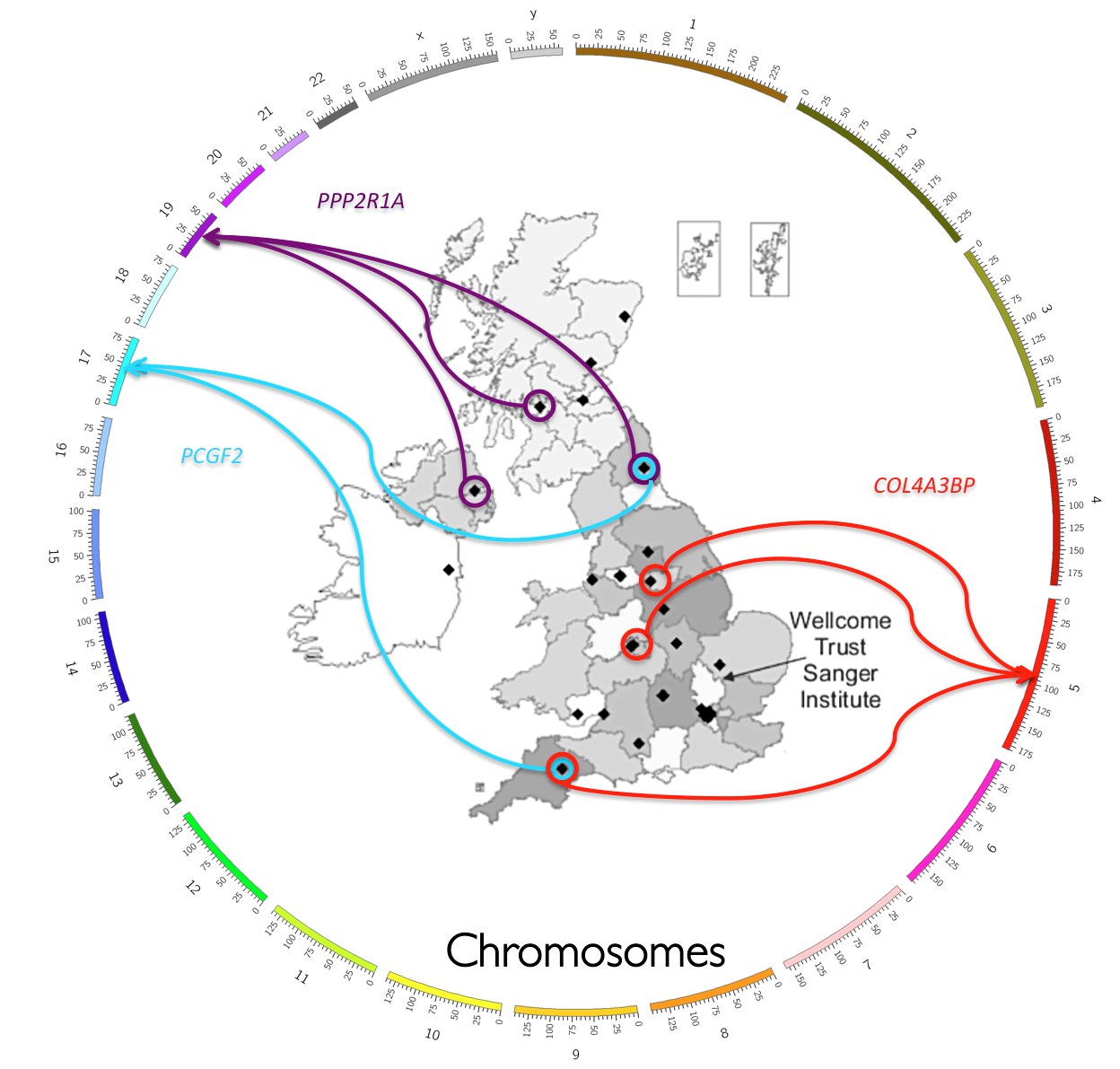
Deciphering Developmental Disorders (DDD)
About Deciphering Developmental Disorders (DDD)
Recruitment into the DDD Study finished in April 2015 and we have recruited nearly 14,000 children with severe undiagnosed developmental disorders, and their parents, from all 24 regional genetics services around the UK and Ireland. The patients were deeply phenotyped by their referring clinician via DECIPHER using the Human Phenotype Ontology.
Samples have been collected at the Wellcome Sanger Institute, where we are applying high resolution exon-arrayCGH and trio exome sequencing to investigate the genetic causes of abnormal development. We have developed a clinical variant filtering pipeline (described in the Lancet 2015 publication below) for finding likely pathogenic variants in known developmental disorder genes, making use of an in-house Developmental Disorders Genotype-to-Phenotype database (DDG2P). This pipeline is enabling us to report back potentially likely diagnostic variants to local clinical teams for validation and communication with families. Likely pathogenic variants are being made publicly available via DECIPHER, and all our data is also available under managed access in the European Genome-phenome Archive (EGA) for further research.
As well as reporting findings in known developmental genes, we have also been able to identify and report back variants in novel genes (see the Nature and Nature Genetics publications in 2015 below). In order to maximise the research outputs of DDD, in addition to primary large-scale research we also have well over 100 complementary analysis projects on specific genes or phenotypes run by members of the regional genetics services and/or the WTSI core team. An increasing number of publications have resulted from work on these projects (see DDD Publications). We also work with family support groups such as UNIQUE, to provide patient information leaflets for new single gene developmental disorders, which are proving very popular with both patients and clinicians.
One issue with large genome sequencing studies such as DDD is the potential identification of findings that are incidental to the primary research question. The DDD study has taken a conservative, clinically-informed approach to this issue and avoided reporting these types of ‘incidental findings’ (IFs) back to participants in the study. A the same time, our associated ethics and social science study (GenomeEthics) has gathered the views of nearly 7000 people from 75 different countries on whether they would want to know about IFs. The survey revealed that most people are in favour of receiving genetic information relating to serious preventable or treatable diseases, though not at the expense of the primary research question (see DDD Publications).
Although recruitment to DDD is finished data generation and analysis is on-going. The DDD team is absolutely committed to trying to find a diagnosis for every participating child. We hope that the findings from DDD will help design more efficient and cheaper diagnostic assays for relevant genetic testing to be offered to all such patients in the UK and so transform clinical practice for children with abnormal development.

Summary of Tools
- DECIPHER (DatabasE of genomiC varIation and Phenotype in Humans using Ensembl Resources), where DDD patient data is deposited.
- DDG2P (Developmental Disorders Genotype-to-Phenotype database), a curated list of genes reported to be associated with developmental disorders.
- EGA (European Genome-phenome archive), where detailed DDD data is deposited for use by researchers.
- Clinical array for developmental disorders, developed by DDD and available from Oxford Gene Technology.
Various novel analytical tools have been developed as part of the DDD study for analysing genomic data, which we will publish. These include calling CNVs from high resolution arrayCGH and exome data, determining inheritance of CNVs from exome data, detecting large-scale mosaicism and UPD from SNP-genotype and exome data, clinical variant filtering of combined exome and array data, and many more. Selected R packages are available upon request.
Contact
If you need help or have any queries, please contact us using the details below.
Sanger people

Professor Matthew Hurles
Director the Wellcome Sanger Institute and Senior Group Leader
External partners and funders
External
Health Innovation Challenge Fund
DDD is funded by the Health Innovation Challenge Fund, a parallel funding partnership between the Wellcome Trust and the Department of Health to stimulate the creation of innovative healthcare products, technologies and interventions and to facilitate their development for the benefit of patients in the NHS and beyond.